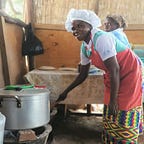The Gendered Burden of Firewood
MCHF is reducing the time rural women spend searching for firewood by promoting the adoption of fuel-efficient cookstoves.
The majority of the women living in Chinthonje village were born and married in the same village. For most of their lives, the 30 or so households have depended on the nearby Dzalanyama Forest for firewood for cooking fuel. Over the last twenty years, deforestation has moved the forest edge further and further away from their village, forcing the women on much longer walks to find and gather wood.
“Dzalanyama forest has been cleared mostly by charcoal producers, to such an extent that now they are even digging up the tree stumps of the trees that were already cut down,” explains Rosina Stephano, a woman living in Chinthonje.
In terms of access to natural resources, rural women in developing countries like Malawi are often the most vulnerable to the consequences of deforestation and forest degradation. Women, who must collect firewood and cook to feed their families due to traditional gender roles, depend more heavily on natural resources and spend the most time walking and carrying large loads of firewood and water. The collection of firewood is yet another unpaid labor performed largely by women.
“Getting firewood for our community is a very big challenge. We are not safe.”
By reducing fuel consumption, women in villages like Chinthonje can reduce their dependence on the forest. In addition, studies show that the use of improved stoves reduces time spent for firewood collection. Women can then invest that time in productive or other activities, leading to enhanced domestic production and a better quality of life.
To achieve this, Malawi-based cooking technology NGO Maeve is partnering with the USAID and UKaid-funded Modern Cooking for Healthy Forests program. Through a performance-based grant, Maeve is distributing 26,500 stoves to villages located in a two-kilometer buffer zone surrounding four major forest reserves, including Dzalanyama.
Saving Women Time
The stove, known as a chitetezo mbaula, which in English means ‘a stove that protects’, is a more efficient alternative to the traditional three-stone cooking fire used by generations of Malawians. The stove is fired clay and protects charcoal and wood from the wind, allowing it to last longer.
Maeve kicked off the strategy by training a network of youth community leaders as agents to help with raising awareness and promoting the stove in the village. The stove reduces fuel consumption by 50 percent compared to traditional cooking stoves. Improved cookstoves mean women spend less time preparing meals. The benefits of adopting the new stove being relayed by agents include the reduction of time spent searching for firewood which has allowed women like Nelia to spend more time with their children and their communities.
“This stove is one of the greatest decisions that I and my fellow women in this village have made. With the same bunch of firewood we would use for just two or three days, now it lasts us seven to 10 days with the chitetezo mbaula,” says Nelia Bonga, a neighbor in Chinthonje.
Maeve Project is a member of the Global Alliance for Clean Cooking as well as the National Cookstove Steering Committee. Maeve is one of dozens of small and medium cleaner cooking enterprises being supported by MCHF through a range of mechanisms including an accelerator program, performance-based grants, and through support to improve the enabling environment.
Watch this video by Maeve Project about the NGO’s work in Malawi: Deforestation and mitigation efforts in Malawi — YouTube
